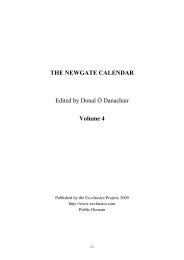PDF format (1.55 Mb) - The Ex-Classics Web Site
PDF format (1.55 Mb) - The Ex-Classics Web Site
PDF format (1.55 Mb) - The Ex-Classics Web Site
Create successful ePaper yourself
Turn your PDF publications into a flip-book with our unique Google optimized e-Paper software.
THE ANATOMY OF MELANCHOLY<br />
his table daily furnished with variety of meats: but hear the physician, he pulls thee by the ear as<br />
thou sittest, and telleth thee, "that nothing can be more noxious to thy health than such variety<br />
and plenty." Temperance is a bridle of gold, and he that can use it aright, ego non summis viris<br />
comparo, sed simillimum Deo judico, is liker a God than a man: for as it will transform a beast to<br />
a man again, so will it make a man a God. To preserve thine honour, health, and to avoid<br />
therefore all those inflations, torments, obstructions, crudities, and diseases that come by a full<br />
diet, the best way is to feed sparingly of one or two dishes at most, to have ventrem bene<br />
moratum, as Seneca calls it, "to choose one of many, and to feed on that alone," as Crato<br />
adviseth his patient. <strong>The</strong> same counsel Prosper Calenus gives to Cardinal Caesius, to use a<br />
moderate and simple diet: and though his table be jovially furnished by reason of his state and<br />
guests, yet for his own part to single out some one savoury dish and feed on it. <strong>The</strong> same is<br />
inculcated by Crato, consil. 9. l. 2. to a noble personage affected with this grievance, he would<br />
have his highness to dine or sup alone, without all his honourable attendance and courtly<br />
company, with a private friend or so, a dish or two, a cup of Rhenish wine, &c. Montanus,<br />
consil. 24. for a noble matron enjoins her one dish, and by no means to drink between meals. <strong>The</strong><br />
like, consil. 229. or not to eat till he be an hungry, which rule Berengarius did most strictly<br />
observe, as Hilbertus, Cenomecensis Episc. writes in his life,<br />
------"cui non fuit unquam<br />
Ante sitim potus, nec cibus ante famem,"<br />
and which all temperate men do constantly keep. It is a frequent solemnity still used with<br />
us, when friends meet, to go to the alehouse or tavern, they are not sociable otherwise: and if<br />
they visit one another's houses, they must both eat and drink. I reprehend it not moderately used;<br />
but to some men nothing can be more offensive; they had better, I speak it with Saint Ambrose,<br />
pour so much water in their shoes.<br />
It much avails likewise to keep good order in our diet, "to eat liquid things first, broths,<br />
fish, and such meats as are sooner corrupted in the stomach; harder meats of digestion must<br />
come last." Crato would have the supper less than the dinner, which Cardan, Contradict. lib. 1.<br />
tract. 5. contradict. 18. disallows, and that by the authority of Galen. 7. art. curat. cap. 6. and for<br />
four reasons he will have the supper biggest: I have read many treatises to this purpose, I know<br />
not how it may concern some few sick men, but for my part generally for all, I should subscribe<br />
to that custom of the Romans, to make a sparing dinner, and a liberal supper; all their preparation<br />
and invitation was still at supper, no mention of dinner. Many reasons I could give, but when all<br />
is said pro and con, Cardan's rule is best, to keep that we are accustomed unto, though it be<br />
naught, and to follow our disposition and appetite in some things is not amiss; to eat sometimes<br />
of a dish which is hurtful, if we have an extraordinary liking to it. Alexander Severus loved hares<br />
and apples above all other meats, as Lampridius relates in his life: one pope pork, another<br />
peacock, &c.; what harm came of it? I conclude our own experience is the best physician; that<br />
diet which is most propitious to one, is often pernicious to another, such is the variety of palates,<br />
humours, and temperatures, let every man observe, and be a law unto himself. Tiberius, in<br />
Tacitus, did laugh at all such, that thirty years of age would ask counsel of others concerning<br />
matters of diet; I say the same.<br />
-32
















